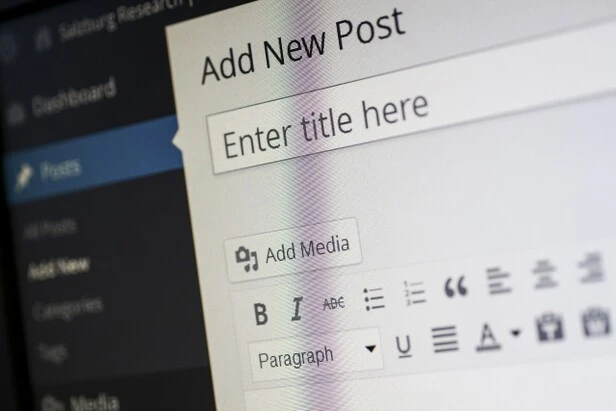How to create a blog with the 5Ws
Published by Incomedia in First steps on the web · Wednesday 24 Apr 2019
If you're dipping your toes into the blogging world, but you're still not sure what starting a blog really means, or why you should make one, this is the guide for you. We know what questions you're asking yourself, so you'll find all the answers here.
Your blog probably won't replace all of your traditional marketing initiatives or your current sales techniques, but it will certainly help make them easier and more credible.




To stay organized, we'll follow the famous 5Ws rule. Remember it? It's the journalism rule that establishes the crucial facts that need to be present in the first line of any article. The 5Ws stand for:
- Who?
- What?
- When?
- Where?
- Why?
At the very end, we'll also answer some additional questions about how to create a blog.
Happy reading!
Who is writing or reading the blog? (Who?)
At its core, a blog is an online diary through which you share content. That means there are people behind and around every blog: the people writing and the people reading.
So there can be at least 2 different approaches to the "Who?" question:
Who should start a blog?
Speaking broadly, anybody who enjoys writing and wants to carve out a space for themselves in the world should at least consider the option of having their own blog. A deeper look reveals that blogs can have really significant advantages.
- Young people looking for their first job - Everybody runs into the same problem when looking for their first job after graduating: "What experience can I put on my CV if I haven't started working yet?" From this perspective, a blog can be a fantastic test bed as well as an effective calling card.

First of all, you're free to experiment on your personal blog, and having to write posts is also a great "excuse" to continue to study and learn more about your subject so you can keep developing your expertise. Second, all the posts you publish on your blog display the knowledge and skills you've already acquired. Finally, just starting, organizing, managing, and moderating a blog shows possible employers clear evidence that you have the abilities they may be looking for in potential hires. This means that having a blog can count as work experience, which you can develop independently and even alongside your studies: which can be great asset for standing out from the competition. - Get passionate - reflect on your life and think about everything you've accomplished so far. Regardless of the work you do or the titles you've earned, you definitely have a story to tell, and you've gained experiences which make you an "expert" in something. Let that "something" be what you write about: whether it's your hobby, your passion, or what you do in your free time. Sharing what you've learned you do can be immensely useful for anyone who shares your interests but hasn't yet taken the same road you have. People like to read stories by people who have overcome similar problems: useful tips and practical guides have become very valuable online content because they drive most searches. And in the end - who knows! - the blog you started for fun could become your job and change your life. Many any fashion, travel, and food bloggers became famous this way: can you name some?
- Writers - in today's era of self-publishing, you need to find effective ways to actively promote yourself and your books to get ahead as a writer. Sure, you have a Facebook profile, an Amazon sales page, and maybe even an author page on Amazon Author Central, but that's not enough. You also need a different kind of space, where you can invite your readers into your virtual home. The best tool for this is a blog, because:
- in a blog, you can dive deeper into your books' themes, and grow your status as an author;
- you can publish new content on a blog; Google likes these regular updates and will rank your pages more favorably, helping you climb up the Search Engine Results Page. Better ranking = wider audience;
- a blog allows you to engage with your readers and start a dialog with them: connecting with the public is key for growing your sales.
- Freelancers - Abandoning the security of a full-time job to go freelance often feels like a leap of faith. If you feel that this is your calling, make sure you're being as clever as you are bold. In order to succeed, you'll need a strategy that allows clients to find you when they search for someone with your skills. Having a blog to promote your freelance work is the perfect way to do this.

A blog lets you showcase your skills and maintain an online CV that's always up-to-date: quality content ensures the right people (potential clients) will find you at the right time (when they need you). Of course, a freelancer's blog is more than just an online diary: you need to develop it with clear goals in mind, to make sure it works for you. Most of all, you need to start right away, before you even register your business, because a blogging is a mid- to long-term strategy. A blog is a truly important tool that, among other things, will help you be less dependent on word-of-mouth for your business. - Companies - As part of a wider digital strategy, a company blog is often an important tool for a number of reasons, the most important of which are:
- capturing potential clients because a blog increases your visibility in search engine results (SEO), meaning people interested in your services will find you more easily;
- gaining the public's trust because what you publish (blog posts as well as extra content like e-books, videos, and infographics) fuels your readers' interest and keeps them coming back;
- putting a face to your company and allowing you to interact with people, connecting with the public instead of remaining anonymous.
Who is a blog written for?
"WHO am I talking to?" is a key question you'll need to answer when you decide to start a blog.
No cheating. Saying "everyone" or "as many people as possible" isn't enough. These answers are too generic and won't help you.
With a little effort, you'll soon realize that your goal is actually to reach a rather small percentage of the millions of active online visitors: you want to reach people who are interested in what you have to offer, whether as a private individual or as a company.
Who are those people? What are their real needs and interests?
Try to interview some of the people who already follow you and create a profile for your imaginary client/reader : give that person a name, a job, and maybe even an appearance. This will help you imagine them as a real person.
Now, each time you write a new post for your blog, picture your imaginary client and ask yourself these questions:
- "Is this content useful to them?"
- "Which problems does it solve?"
Not only can it be easier to write as though you were giving a friend advice, or even just trying to entertain them, rather than to write to a total stranger, it's also much more useful.
What should your blog be about? (What?)
In order for a blog to be successful, you not only need to know who you're writing to, you also need a clear idea of what you want to say. What will be the main topic of all the posts you write?

Of course this will all be determined by your interests and your needs. If you start a personal blog, there's no sense writing about something you're not passionate and knowledgeable about. If you create a blog for your company, the products or services you sell will be the focus, since the goal is to attract clients.
Once you've identified your main topic, do some research to find out if there really is a target audience for it, how much competition you may be facing, and especially, if there is a gap you could fill to create a niche for yourself and gain success. Services like Semrush and Seozoom can help you scope out the territory during this research phase.
Ideally, you would find a subject area which draws lots of search queries but has little competition; of course, that's easier said than done. Don't get discouraged. Study your competition: you might realize that there are unexplored areas that you could work on, or that you have a unique perspective on the topic. If you can create content that adds value compared to what's already out there, your chances of success will increase accordingly.
Now that you have a clearly defined idea for your project, you can start thinking about what kind of content to produce and organize it into an editorial plan.
If you work strategically, you will soon realize that you'll need to publish different kinds of posts in your blog. An editorial plan will help you maintain coherence while pursuing several different goals. In fact, you'll generally need to produce:
- long, in-depth posts that deal with specific keywords → goal: SEO
- short, appealing posts → goal: ENGAGEMENT
- posts that incite people to subscribe → goal: GENERATING LEADS
- posts that lead to sales → goal: CONVERSION
To schedule your posts, you can then translate your editorial plan into an editorial calendar. An editorial calendar can be as simple as a sheet of graph paper in which you list all your posts, along with details like their publication dates, titles, tags, categories, sources, etc.
Often, people tend to take an "instinctive" approach when starting their blog: writing and publishing posts if and when inspiration strikes. Having a plan and an editorial calendar lets you reach a new level of quality: it allows you to maintain a medium-term perspective and prepare content that you can then schedule, so you can post regularly and consistently.
When should you start a blog? (When?)
If you're asking yourself, "When should I start a blog?", the answer is almost always: "yesterday".
Everyone likes to get immediate results for their work, but blogs don't work that way: you need to have medium- to long-term perspective. You need start to write and publish in order for search engines to have time to index your content, and if your content is good, to push them up in the SERP. That's when readers will start to find you, read your posts, and hopefully, enjoy them.
It will take some time for the seeds you plant to bear their fruits. So you should start right away. At first, only a few people may read the posts you publish: take advantage of this time to experiment, refine, and improve your craft. Once you start gaining a consistent audience, your blog will already be full of interesting content, which will bolster your image and your credibility.
Where should I publish my blog? (Where?)
Ok, so now you know what you want to say and you have your initial content ready. It's time to take it online.
Where should you create your blog? This is another question to consider.
If your goal is to create a free blog, go to Wordpress.com, Blogger (Google's platform), or Medium. Sign up for their services and you can start to write and publish in just a few seconds.
Sure, you got your blog for free, but you're a guest in someone else's house: you need to follow their rules - maybe settle for a less-than-attractive tertiary domain name - and accept that you won't be independent.
The more important your blog is to your web strategy, the more you should be willing to invest to optimize it and make sure it gives you the most opportunities for growth.
If you choose to invest in a more professional solution rather than just creating a free blog, you'll need to tackle the following steps:
Choose your blog's name and domain
Your blog needs a name, of course: you need to give it an identity. If you're running a company blog, you can just carry over the name of your business. On the other hand, if you have a personal blog, you can decide to emphasize your own identity and use your name as the title, or you can base the title off your project.

In any case, it's important to give your blog a name that's simple and easy to remember, pronounce, and write. Choose something that sparks curiosity and interest, which clearly and concisely conveys your personality. Finally, remember that your blog's name should also correspond to the domain: so make sure the domain is still available.
At this point, all you need to do is visit a provider's website and buy your domain, choosing the extension (.com, .org, etc.) that best suits your project. If you have the foresight, you should also buy the other main, top-level domains in order to protect your brand.
Here's a tip: in addition to your name, consider creating a logo for your blog. It's crucial for your project's identity. If you don't know where to start, there are many online solutions that can can help you create your own logo, often for free: try DesignEvo, for example.
Choose the right hosting service
Hosting is what allows your blog to be found online, and it's more important than it may seem. A good hosting service guarantees fast loading times and an uptime of close to 100%: this means your blog will always be available and that readers won't have to wait for pages to load. As you can imagine, all of this translates into a great user experience for your readers. And reader satisfaction is one of the factors Google values the most, which means it will rank your pages more favorably.
Plus, a good hosting service should guarantee high security standards and adequate technical support.
Don't worry: there are great providers who offer domain registration and high-quality hosting services at very reasonable prices. You'll see, the annual investment this requires absolutely pays off.
Now that you have a name, a domain, and a place to publish, you need a tool for creating your posts. WebSite X5 is a software for creating websites, blogs, and e-commerce stores: it's easy, fast, and affordable. Try it!
Why publish a blog? (Why?)
By now, it should be pretty clear WHY it's important to have a blog, and what advantages you can gain.
Here's a short recap in case you need one:
- Generally, search engines like blogs because their content is constantly updated, which helps improve your visibility.
- More visibility through search engines means more traffic for your website.
- More traffic means more people who are potentially interested in what you're offering, and therefore more opportunities for conversion. Depending on your goals, conversion might translate into sales, service subscriptions, or requests for contact/a quote for your services.
- Blogs contribute to branding, which increases the perceived value of a brand or product, as well as your value as an author/expert.
- By managing comments, blogs also offer you the opportunity to interact and connect with your readers/clients. The quality of this relationship is the best guarantee for a successful project.
- A blog increases transparency and puts a human face to a company: this helps build your clients' trust.
How?
We know: we've answered some of your biggest concerns, but you still have a few lingering questions: For example:
- How do you write a high-quality post?
- How do I promote my content?
- How do I earn money with a personal blog?
- How do I comply with Cookie and Privacy regulations?
We'll go through this list and provide some answers.
How do you write a high-quality post?
You probably decided to start a personal blog because you like to write. When you prepare to write your posts, remember that your content will not only need to be enjoyable to readers, it also needs to satisfy Google, which will assign value to it and determine its SERP ranking.
So make sure to keep in mind that a high-quality postwill need to have the following elements:
- Title: this should grab attention, spark curiosity without revealing too much, and contain the keywords for your post's topic.
- Introduction: this is what convinces the reader that the post contains the information they need.
- Content: this should add value, meaning it should be useful and high-quality. Always keep in mind who you're writing for, and what needs you're trying to respond to.
- Call to Action: every post should have a CTA, an explicit call to action. If you want your readers to do something (subscribe, download content, make a purchase), find the right spot in the post to directly ask them to do so.
- Images: a wall of text can scare away and discourage even the most passionate reader. Find appropriate images to go along with your content: there are many libraries of free images: find some that aren't over-used and that fit your topic and your blog's general style.
How do I promote my content?
You're right: writing good content and creating an attractive blog is only the first step. To really be successful , you need to actively promote your blog in order to attract visitors and create an audience that's continuously growing.

Take several approaches:
- On-site SEO: all your content needs to be optimized for search engines in order to climb to the top of the SERP results. Make sure your post contains keywords, header tags, and ALT text.
- Off-site SEO: your goal is link building, which means creating a network of links that lead to your blog. You can write for other blogs in order to get your name out there, or offer to exchange links with other bloggers. What's important is to generate "dofollow" links that can add value to your pages.
- Social networks: Facebook, Instagram, LinkedIn, and other social networks (choose whichever ones most are most appropriate for your audience) are a great channel for giving your blog's content a push, especially if you're willing to invest a little bit in a few ad campaigns.
- Newsletter: a blog with a newsletter instantly seems more professional. Plus, a newsletter is a very powerful tool for communicating directly with your readers and updating them about what you're publishing. Try to create the broadest-possible mailing list: it will also come in handy for monetizing your efforts.
How do I earn money with a personal blog?
Since you can't live off passion alone, trying to make money from your blogging activities is totally legitimate.
Yes, you can earn money from a blog: as proven by the many bloggers who support themselves this way. However, don't expect to start earning money immediately, or without having to put in a lot of effort to get satisfactory results. As we mentioned above, this takes time, perseverance, and strategy.

There are many ways to earn money from a blog: so we suggest diversifying. Don't rely on a single method: experiment and find what works best for your project and for your target audience.
These approaches include:
- signing up for the Adsense program or other ad placement systems.
- selling banner space;
- joining affiliate programs;
- selling informational products (e-books, video lessons, templates, etc.);
- writing and publishing reviews to promote third-party products/services;
- publishing sponsored content;
- for non-profits and organizations, adding a button/form for collecting donations;
In addition, once you build a certain reputation as an expert through your blog, you can earn income by offering training, organizing courses, participating in events, or other similar activities.
How do I comply with Cookie and Privacy regulations?
If you're wondering, "Are there any legal aspects I should keep in mind when starting my blog?" the answer is "Yes". You need to comply with European regulations on Cookies and data handling: don't underestimate these issues, the resulting fines can be hefty.
Remember, the GDPR (General Data Protection Regulation) applies to anybody handling personal data. That means it applies to you if your blog collects e-mail addresses for your newsletter, or any other information about your readers.
We created a guide to help you understand what's involved: GDPR: What It Is, What's Changing, What to Do:
Without going too far in detail, we do suggest 2 solutions by iubenda to make sure you're in compliance: Internal Privacy Management and Consent Solution.
Conclusion
You made it to the end of the guide! We tried to answer the questions you've surely been grappling with if you're thinking of starting a blog. As you can see, a blog is a powerful tool: it requires effort and consistency, but it can allow you to achieve valuable results, both in terms of branding as well as sales.
So when can we read your first post?

